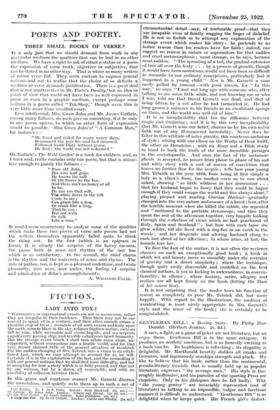POETS AND POETRY.
THREE SMALL BOOKS OF VERSE.* IT is only just that we should demand from work in any particular medium the qualities that can be had in no other
medium. We have a right to ask of either a statue or a poem
the expression of some truth, objective or subjective, that can be stated in no other way. That is where so many writers
of minor verse fail. They seem content to express general notions and not to realize that the choice of so definite a medium as verse demands justification. There is a great deal
that is not unattractive in Mr. Pinto's Duality,' but no idea or point of view that could not have been as well expressed in
prose or even in a graphic medium, except perhaps some notions in a poem called "Tea-Shop," though even this is very little more than versified essay.
Less intellectual, Miss Gwen John and Mr. James Guthrie, among many failures, do each give us something, if it be only in one poem apiece, to which no other, form of expression
would be possible. Miss Gwen John's2 " A Common Man," for instance :— " He lived and toiled for many weary days, Renounced the joys his soul had dreamed, Followed harsh Duty without praise. He died : the world was not redeemed."
Mr. Guthrie's The Wild Garden' is a book for children, and, as
I have said, really contains only one poem, but that is attrac- tive enough to justify thelailures :- "Poor old John, His wits half gone,
He knows the call
Of the flower to the bee, And there ain't no honey at all In he.
He can coo that soft, The white doves in the loft Come to see ; Can grunt like a hog,.
Or croak like a frog, That he can ; But not walk Or talk Like a man."
It would seem unnecessary to analyse some of the qualities which make these two pieces of verse into poems had not
the writers themselves apparently failed quite to think the thing out. In the first (which is an epigram in
form), it is clearly the surprise of the heavy caesura, the pause both in sense and rhythm of the last line
which is so satisfactory. In the second, the chief charm is the rhythm and the naiveness of sense and rhyme. The note of pathos, too, is kept as a pleasant undertone, and twists pleasantly, now over, now under, the feeling of surprise and admiration at John's accomplishments.
A. WILLIAMS-ELLIS.










































 Previous page
Previous page